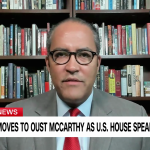The House of Representatives fell silent as Steve Womack, the Republican congressman from Arkansas, read the results of the historic vote: “The office of the Speaker of the House of the United States House of Representatives is hereby declared vacant.”
“Now what?” one unidentified lawmaker loudly replied.
It was a question that echoed across Washington on Tuesday evening, after the House took the unprecedented step of removing Kevin McCarthy as Speaker of the House — plunging the Republican party into turmoil and grinding the legislative process on Capitol Hill to a halt.
McCarthy had long been on shaky ground, after he was elected Speaker on the 15th round of voting back in January, thanks in part to a rules change that made it easier for a Speaker to be ousted. But his swift and dramatic downfall this week was a stunning turn of events that sent shockwaves through both political parties.
Eight rebel Republicans defied their party leader and endorsed a “motion to vacate”, spearheaded by Matt Gaetz, the controversial Republican congressman from Florida who has long been a thorn in McCarthy’s side.
They were joined by the entire House Democratic caucus, who refused to bail out McCarthy, a Republican Speaker who Hakeem Jeffries, the top House Democrat, said was “unwilling to break from Maga extremism in an authentic and comprehensive manner”.
Almost immediately, the Speaker’s gavel was handed to Patrick McHenry, the Republican congressman from North Carolina and a loyal McCarthy ally who had been designated “Speaker pro tempore”.
McHenry is merely a caretaker to preside over the election of a new Speaker — a process that is shrouded in uncertainty and many Washington veterans warn could take days, if not weeks, to be resolved.
House members were advised on Tuesday night that no further votes were expected this week — meaning a Speaker will not be elected until next week, at the earliest.
The stalemate could push Congress even further into chaos, given House rules dictate that the chamber cannot deal with any legislative business before a Speaker is elected, even as lawmakers stare down another looming government funding deadline in mid-November.
McCarthy made clear late on Tuesday that he did not intend to stand again for Speaker, leaving the field wide open for any number of Republicans to throw their names in the hat.
But those vying to replace him are likely to face an uphill battle not unfamiliar to McCarthy’s.
A Speaker needs to be elected by the majority of the House of Representatives — no easy feat, because Republicans control the chamber by a razor-thin margin that allows a vocal minority of the party’s lawmakers to hold up crucial votes.
Given House Democrats are all but certain to oppose any Republican Speaker nominee, McCarthy’s eventual successor will need to win over at least some of the eight rebels who voted to take the Speaker’s gavel from the California congressman.
McCarthy slammed his detractors in a lengthy press conference, saying that by going after him for his efforts to broker a government funding deal with Democrats, they exposed a “real institutional problem” in Congress.
“In today’s world, if you are sitting in Congress, and you took a gamble to make sure the government was still open, and eight people can throw you out as Speaker . . . I think you have got a real divide,” he said.
Gaetz and others did not “have the right” to call themselves conservatives, McCarthy added: “They don’t get to say they’re conservative because they’re angry and they’re chaotic. That’s not the party I belong to.”
Several prominent Republicans, including former House Speaker Newt Gingrich, have called for Gaetz to be censured, or even expelled from the party.
“Matt Gaetz you just sabotaged our party by showing the American people that we can’t be taken seriously to govern,” said Dan Eberhart, a big Republican donor. “By letting the perfect be the enemy of the good, you have toppled a tireless and transparent conservative Speaker.”
Several House members have said while they disagree with Gaetz’s tactics, he does not deserve to be booted out.
“Matt Gaetz made a lot of good points today,” said Marjorie Taylor Greene, the Republican congresswoman from Georgia who was among McCarthy’s loudest supporters.
“We need change in Washington,” she told the Financial Times. “I am not against what [Gaetz] said. I just don’t like the strategy.”
Many influential Republicans have warned that the infighting on display in the House on Tuesday undermines the party’s efforts as it gears up for the presidential and congressional elections in 2024.
“I think every day we’re not talking about the failed [Joe] Biden presidency and how to fix a broken border, it’s a bad day for the cause,” said Lindsey Graham, the Republican senator from South Carolina.
His comments echoed Donald Trump, the former president and current frontrunner for the party’s presidential nomination. Trump, who has been appearing in a New York courthouse this week at his civil fraud trial, had been uncharacteristically quiet as McCarthy fought for his political life in recent days.
But in a post on Truth Social, his social media platform, on Tuesday, he expressed disapproval at the events unfolding on Capitol Hill: “Why is it that Republicans are always fighting among themselves, why aren’t they fighting the radical left Democrats who are destroying our country?”
Read the full article here



